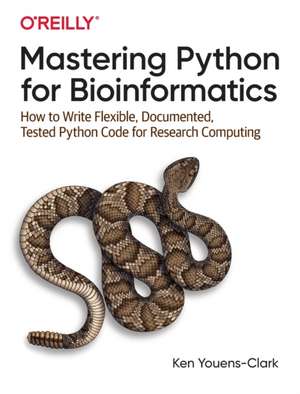Mastering Python for Bioinformatics
Autor Ken Youens–clarken Limba Engleză Paperback – 17 mai 2021
Ken Youens-Clark, author of Tiny Python Projects (Manning), demonstrates not only how to write effective Python code but also how to use tests to write and refactor scientific programs. You'll learn the latest Python features and tools including linters, formatters, type checkers, and tests to create documented and tested programs. You'll also tackle 14 challenges in Rosalind, a problem-solving platform for learning bioinformatics and programming.
- Create command-line Python programs to document and validate parameters
- Write tests to verify refactor programs and confirm they're correct
- Address bioinformatics ideas using Python data structures and modules such as Biopython
- Create reproducible shortcuts and workflows using makefiles
- Parse essential bioinformatics file formats such as FASTA and FASTQ
- Find patterns of text using regular expressions
- Use higher-order functions in Python like filter(), map(), and reduce()
Preț: 454.45 lei
Preț vechi: 568.06 lei
-20% Nou
Puncte Express: 682
Preț estimativ în valută:
86.97€ • 90.68$ • 72.28£
86.97€ • 90.68$ • 72.28£
Carte disponibilă
Livrare economică 27 februarie-13 martie
Livrare express 13-19 februarie pentru 41.12 lei
Preluare comenzi: 021 569.72.76
Specificații
ISBN-13: 9781098100889
ISBN-10: 1098100883
Pagini: 400
Dimensiuni: 177 x 234 x 26 mm
Greutate: 0.72 kg
Editura: O'Reilly
ISBN-10: 1098100883
Pagini: 400
Dimensiuni: 177 x 234 x 26 mm
Greutate: 0.72 kg
Editura: O'Reilly
Notă biografică
Ken Youens-Clark works as a Data Engineer at The Critical Path Institute where he helps partners in industry, academia, and government find novel drug therapies for diseases ranging from cancer and tuberculosis to thousands of rare diseases. His career in bioinformatics began in 2001 when he joined a plant genomics project at Cold Spring Harbor Laboratory under the direction of Dr. Lincoln Stein, a prominent author of books and modules in Perl and an early advocate for open software, data, and science. In 2014 Ken moved to Tucson, AZ, to work as a Senior Scientific Programmer at the University of Arizona where he completed a MS in Biosystems Engineering in 2019. While at UA, Ken enjoyed teaching programming and bioinformatics skills, and used some of those ideas in his first book, Tiny Python Projects (Manning, 2020), which uses a test-driven development approach to teaching Python.
Descriere
This practical guide shows postdoc bioinformatics professionals and students how to exploit the best parts of Python to solve problems in biology while creating documented, tested, reproducible software.
